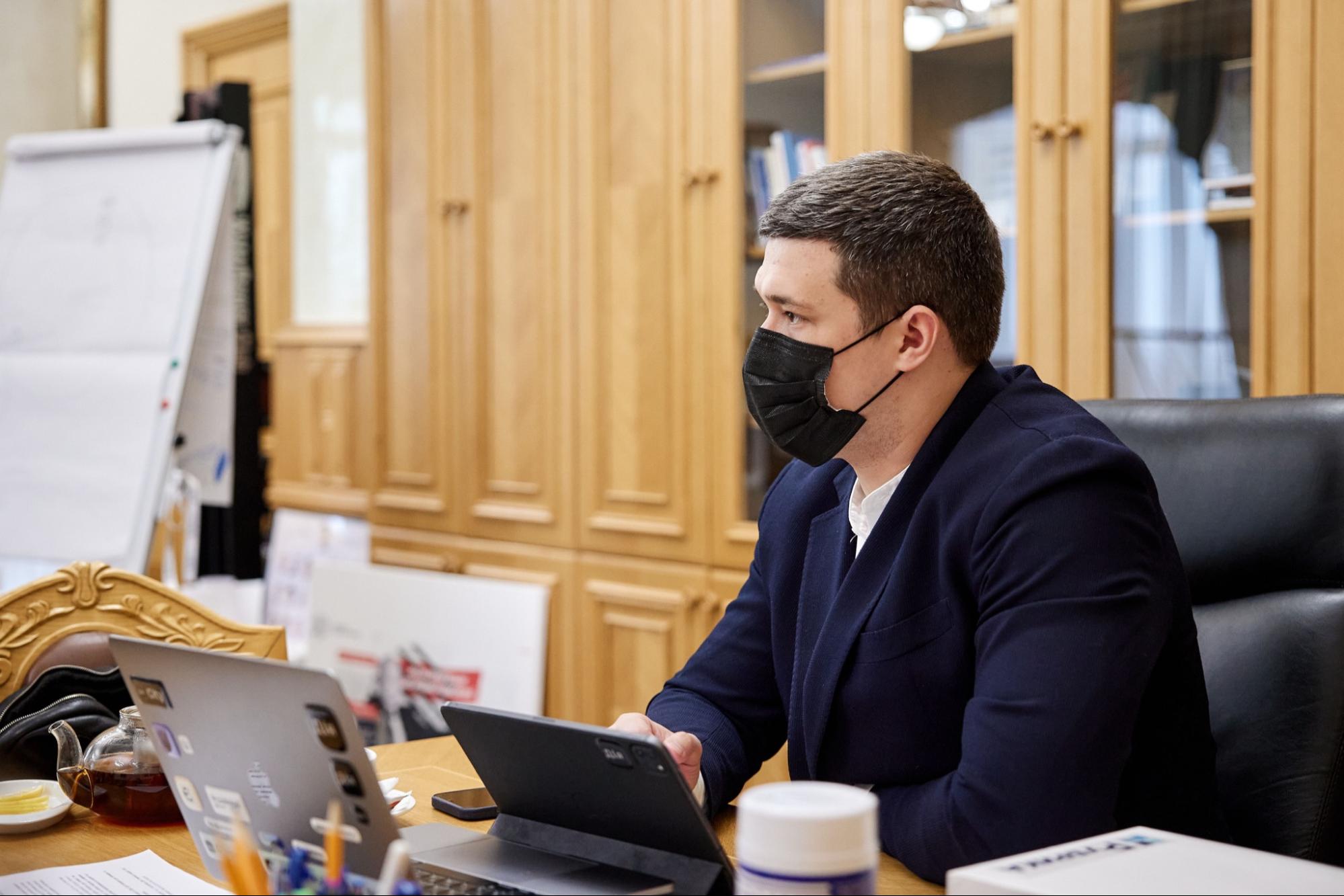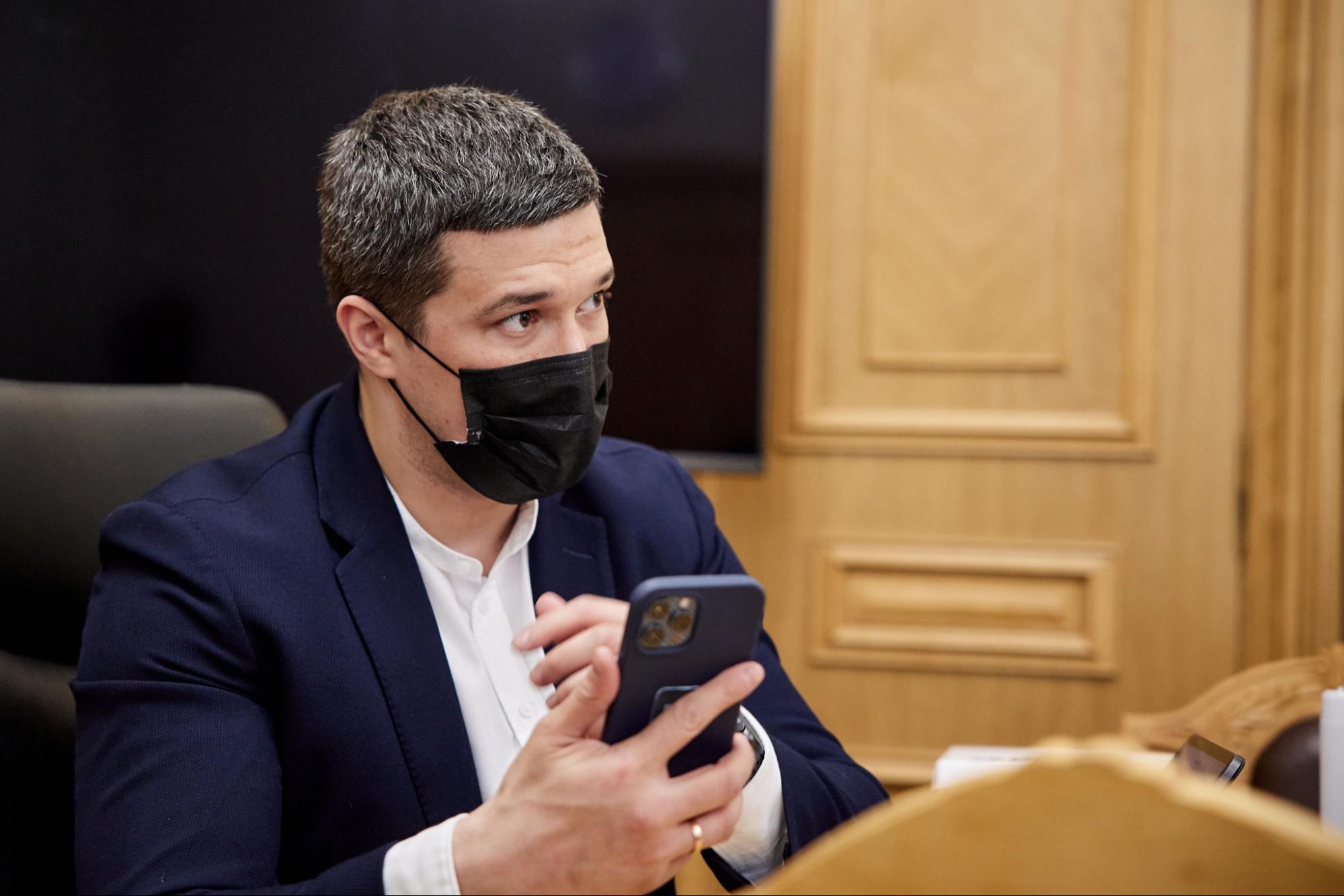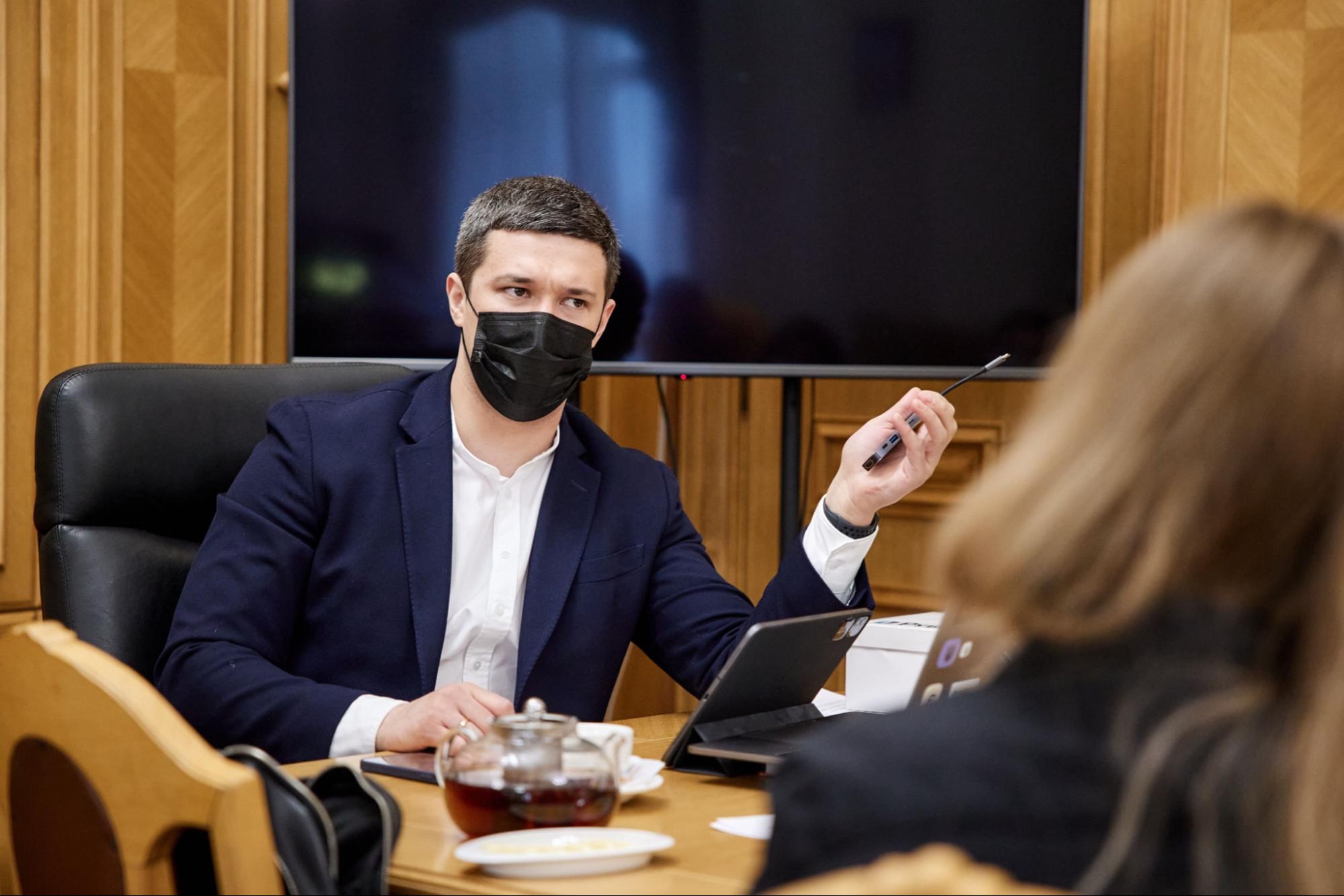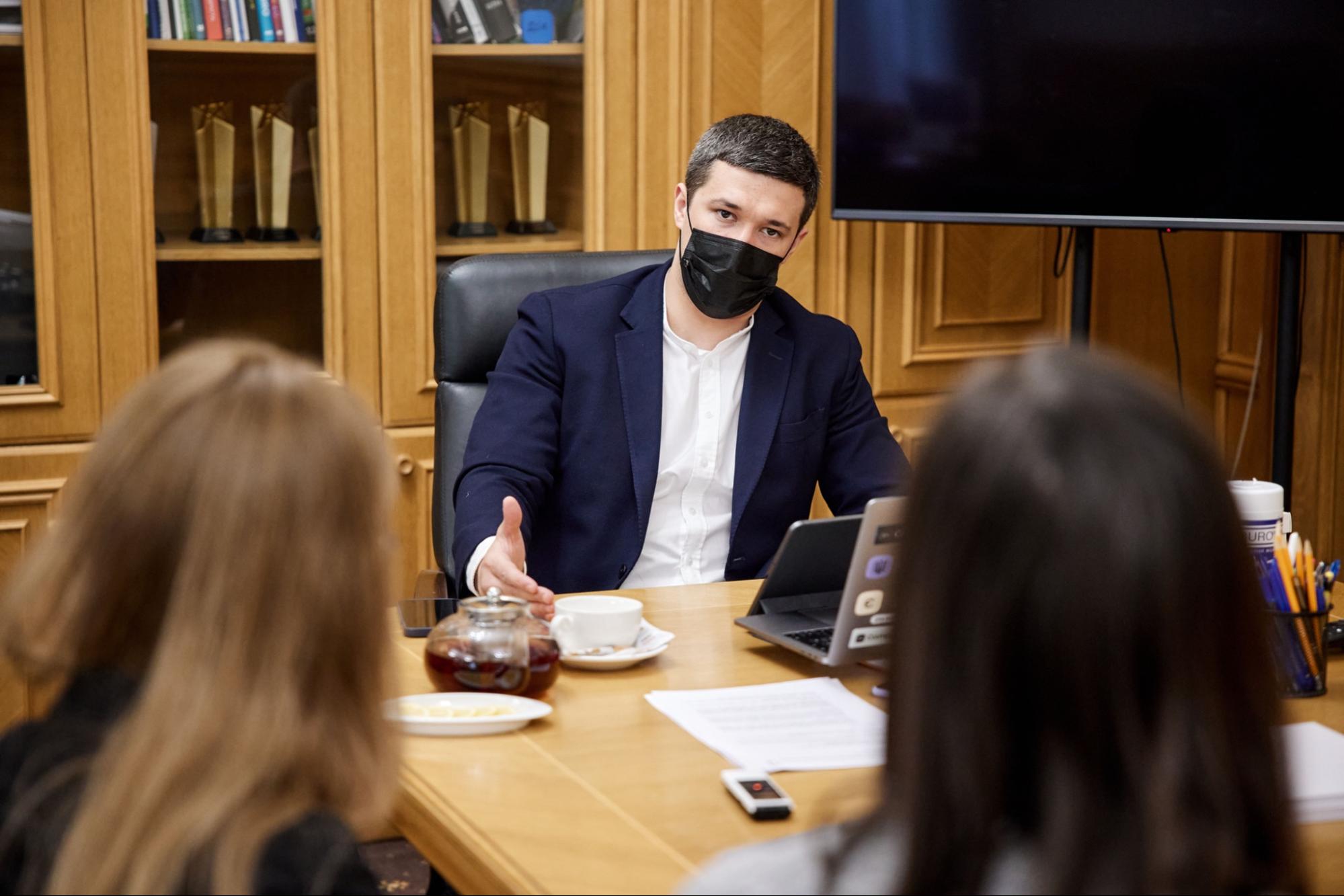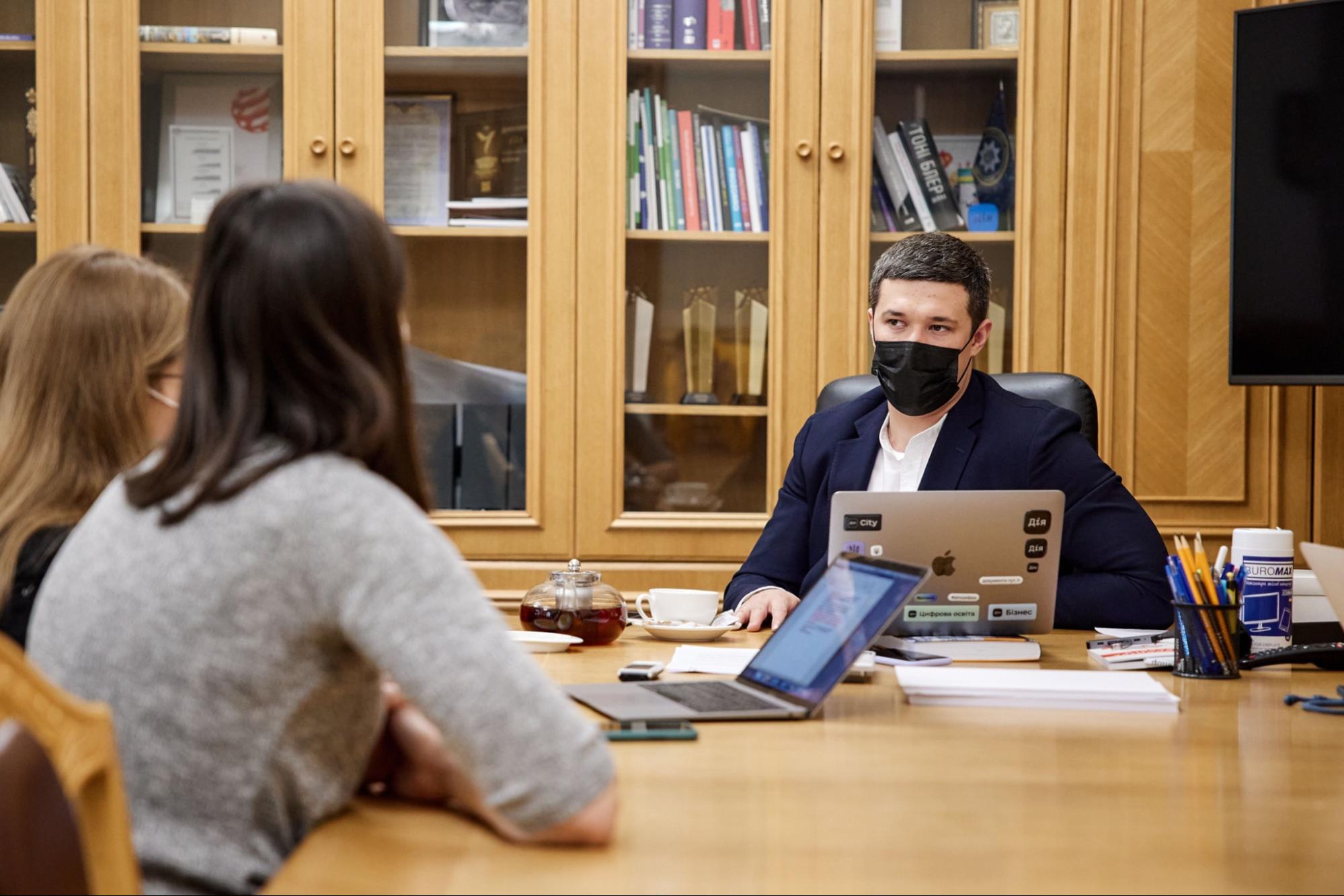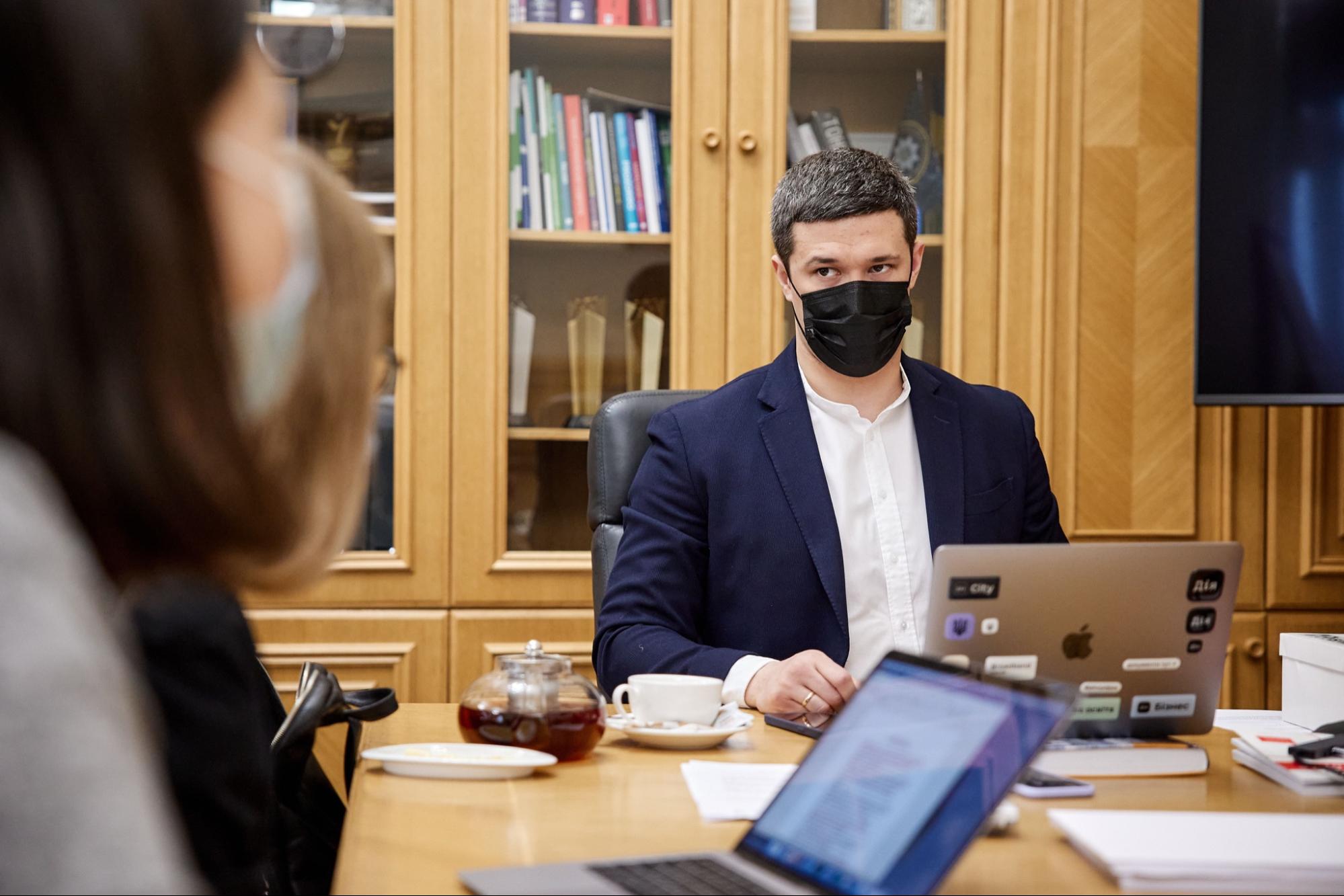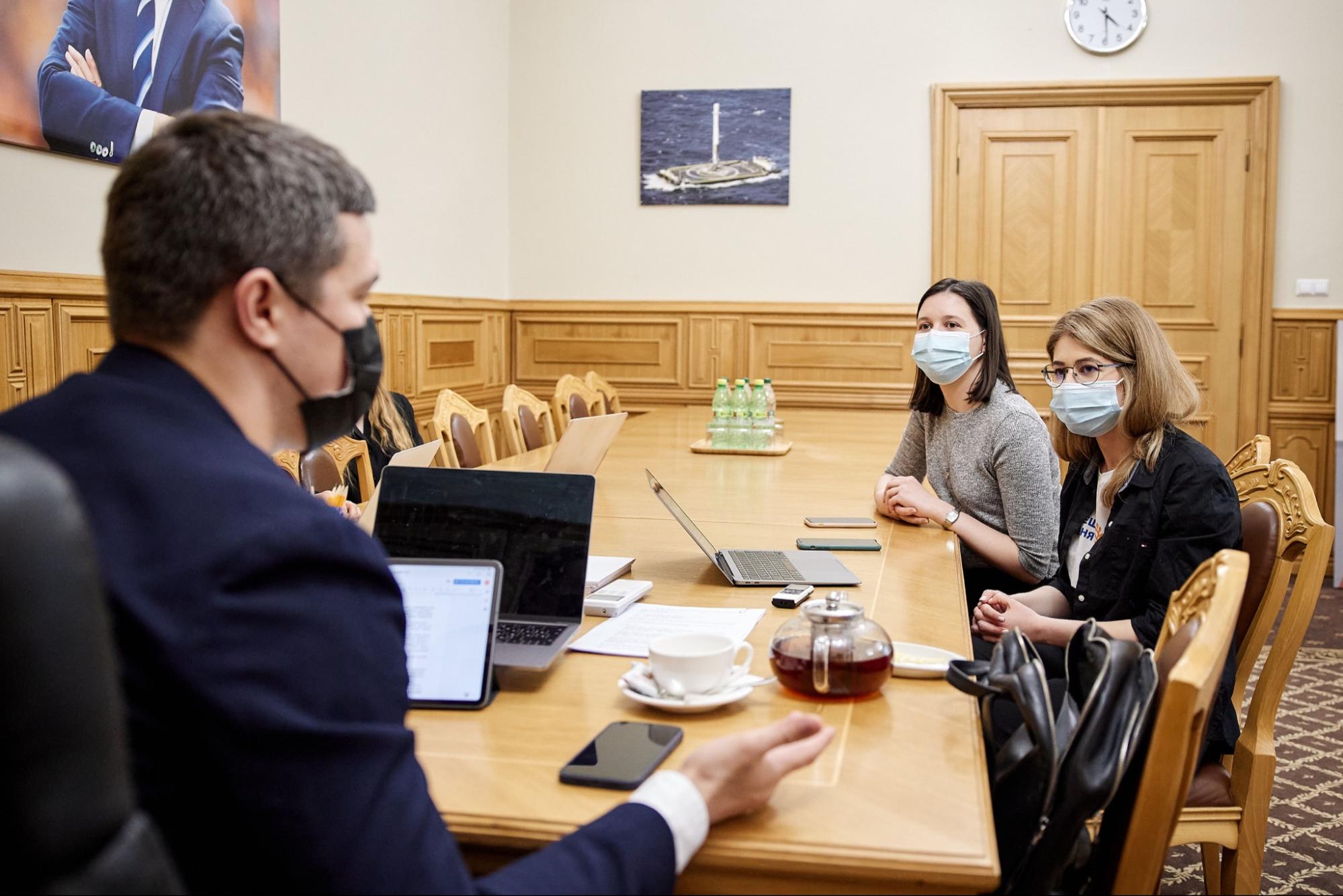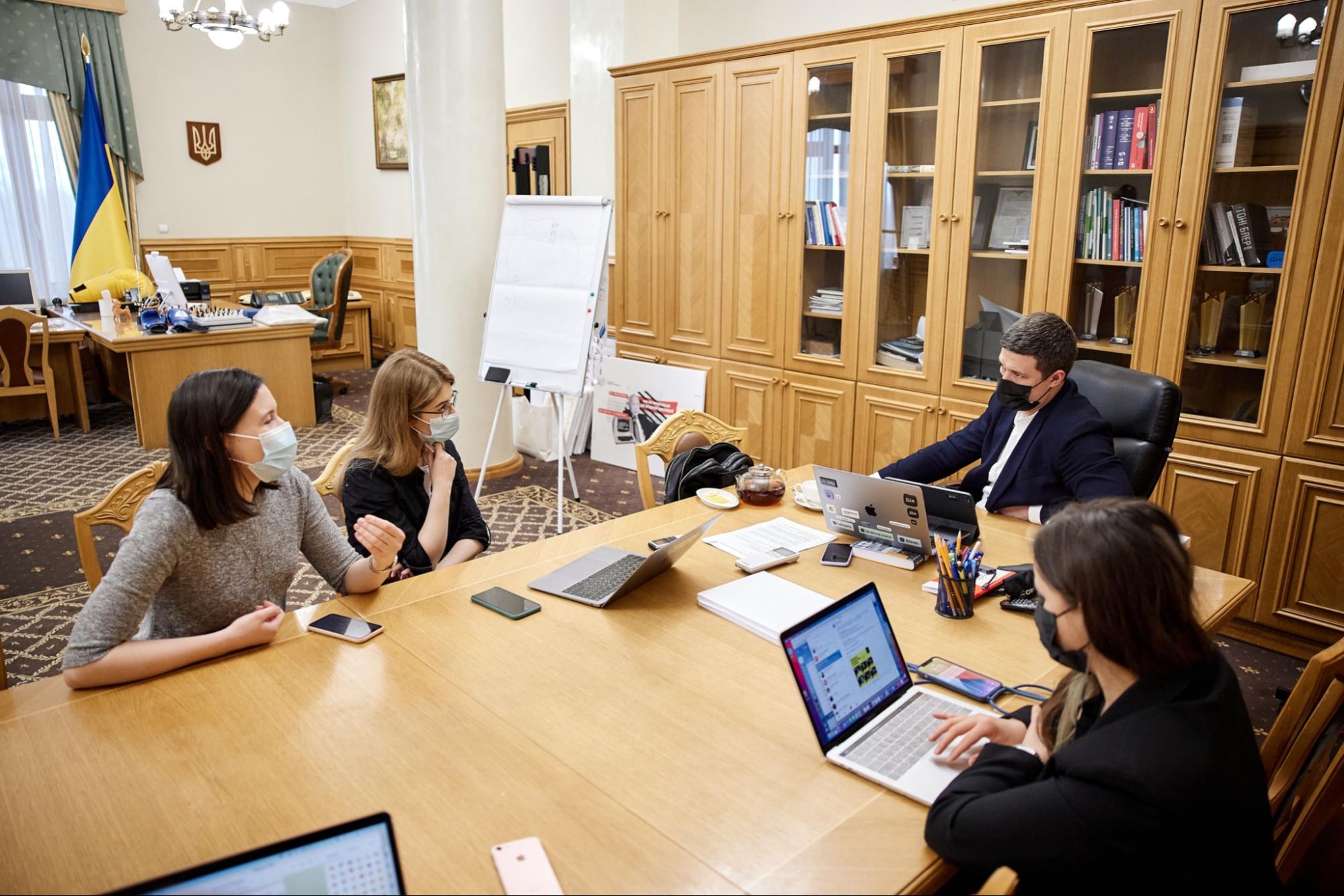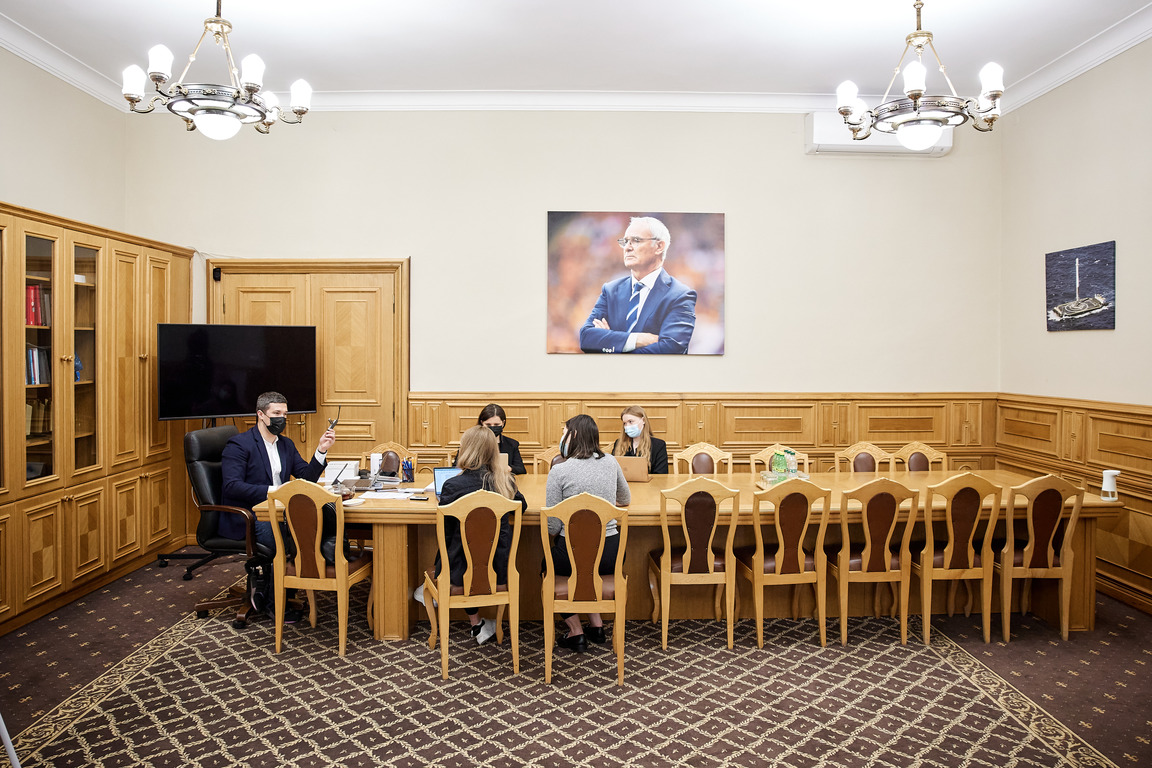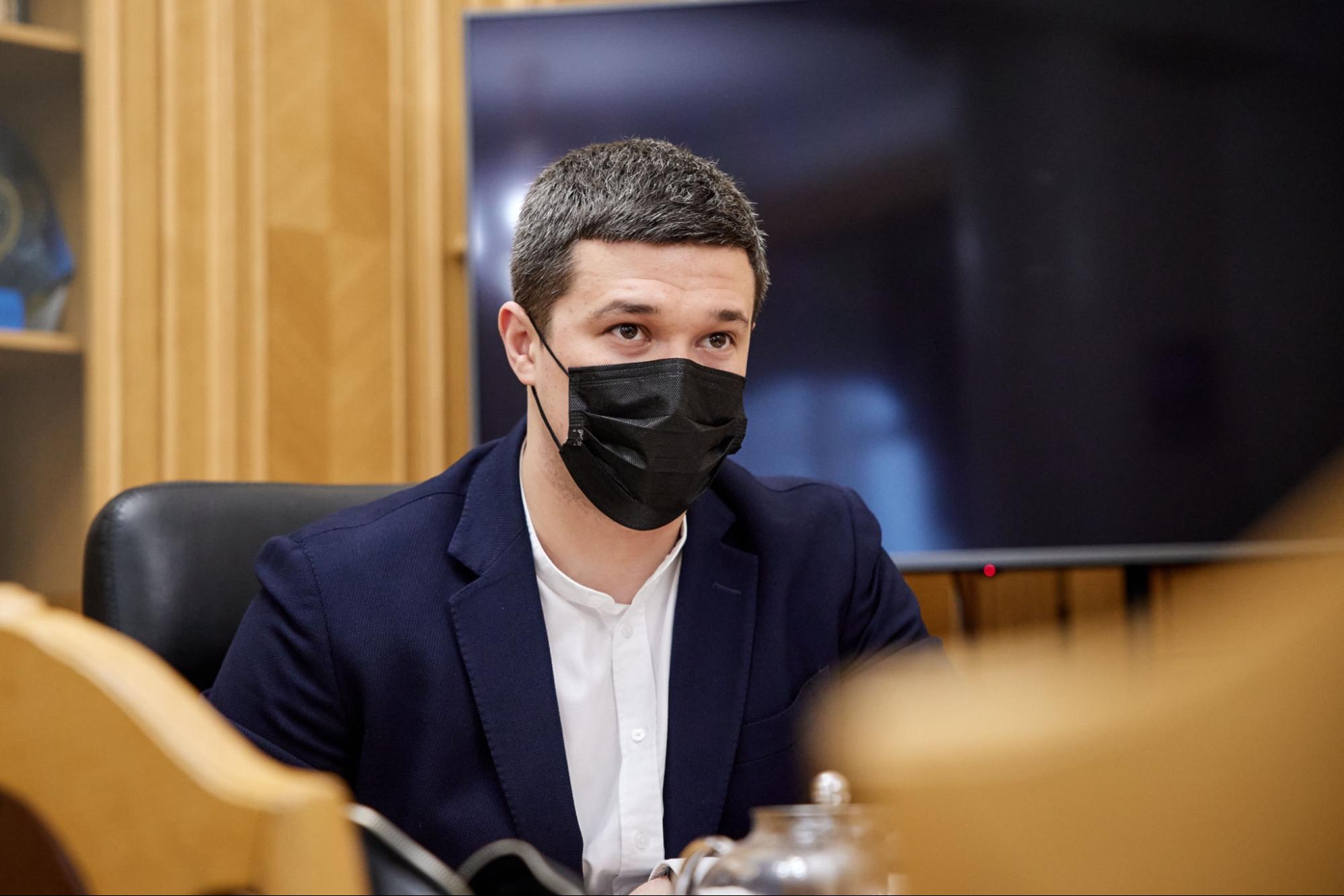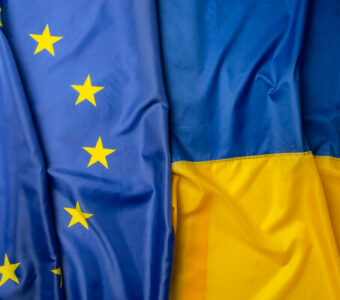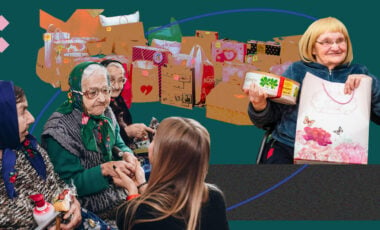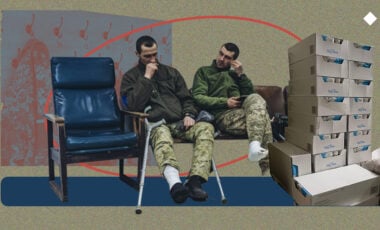"You'll bliss out": what new things await us in "Diia" and other digitalization surprises. Interview with Mykhailo Fedorov
Paying taxes in two clicks, e-passports, and even functions related to direct democracy. We explain what's on the agenda of the Ministry of Digital Transformation and how Ukraine's youngest minister works.
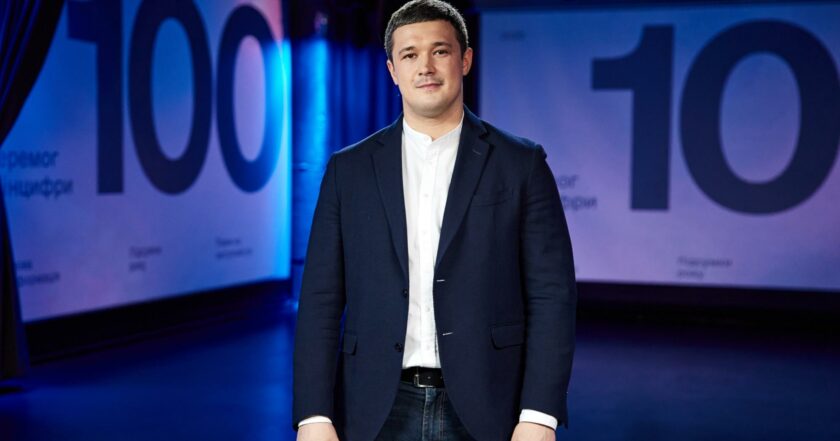
We met with Mykhailo Fedorov, the youngest minister in Ukrainian history, responsible for state digitalization, in the Cabinet of Ministers of Ukraine. There, in the corridors covered with soft carpets, it's quiet: we can't help but lower our voices when talking. In Mykhailo Fedorov's office, the atmosphere is completely different: it is lively, fingers are tapping on keyboards, and we can hear the laughter now and then. You can feel that ideas are in the air. As we find out later, it's true: it is here that employees of the Ministry of Digital Transformation regularly gather for brainstorms of new ideas and projects.
We discuss Ukraine's progress and weaknesses in digitalization, what new services should be expected from Diia, when individual entrepreneurs can pay taxes in a few clicks, and when all public services can be received through a smartphone. By the way, just before our arrival, a briefing with the State Tax Service about simplifying the payment of taxes by individual entrepreneurs ended, so the conversation couldn't start otherwise.
Services in "Diia": sole proprietors, vaccination, electronic passport
— The end of the quarter is a big pain for many individual entrepreneurs in the country. Tell us what improvements await us in this area and will we be able to submit all declarations and pay taxes through Diia in this quarter?
— We're launching Diia Summit this spring. We planned it for the end of April, but most likely it'll happen only after the red zone situation ends in Kyiv and we can gather people to present everything.
We're launching the ability to submit a tax return and pay taxes in Diia, both in the application and on the portal. We've made it easy to fill out 2 pages up to 4 questions. And now it'll be very simple and convenient to file a tax return and pay taxes in a few clicks.
Here, all information is automatically pulled. You only need to report the amount of income. You can even integrate with the bank, and Diia will automatically pull up the amount of income for you and calculate the tax to be paid. You can simply enter the amount you want to declare manually and pay taxes like this. And you won't need to fill in extra data.
At the same time, you'll receive notifications, push-reminders about what you need to pay so that you don't forget.
— Reminders are very handy!
— But it would've been impossible if we hadn't planned to simultaneously launch an electronic signature in Diia.
By the way, it's an ordinary person's electronic signature. It can, of course, be downloaded from the bank, but it's not very safe to store it on a computer, for instance, it's often sent to a messenger: again questions about security. And now, to receive an electronic signature on a secure medium, you need to go offline.
We're launching an electronic signature that will be in a smartphone, there's no need to go anywhere offline, and it's also very secure. It's stored in a distributed manner: part of the signature is on the smartphone, part is in the cloud. And, there's also face biometrics identification.
There you need to blink, turn your head, execute the correct commands of the smartphone, and your face, facial biometrics is identified with a photo when you received your passport and international passport in the registry. Thus, it's impossible to generate an electronic signature without you. With it, you'll be able to a tax return and pay taxes very simply in a few clicks.
— Is there any possibility of not being recognized from your passport photo?
— We specifically test each service before launching with a tester. So far, we have had no issues. Surely, there'll be all sorts of situations, but we'll find solutions for them. Therefore, as long as there was no problem during the test, everything should be fine.
This is Face-ID, photo-ID technology. So it should work fine. We tested it; we're simultaneously launching the possibility of identification, authorization in Diia not through a bank ID, as it's now, but through an ID passport. It will be magical: you take the ID passport, put it on the phone, and the chip is read. And even if you don't have a mobile bank, you can log in to Diia.
— Will all these innovations be implemented together with Diia Summit?
— Yes. Therefore, the next tax declarations in July-August can be submitted through Diia. I was an individual entrepreneur, and now I've tested everything. It's just a bomb! You'll bliss out.
— Another hot topic: the line for COVID-19 vaccination. 450 thousand users have already signed up for it. Is there someone who got vaccinated in this line? How to understand what your number is in this line, and when your hour will arrive?
— Vaccination is clearly happening in sequence, declared by the Ministry of Health. And people over 80 years old have already received vaccines from the line at Diia. By the way, there were 1,500 people of this age registered with Diia. And 50% of these people have already been vaccinated. That is, people have already been taken from the list and vaccinated.
Now there are some changes to the list. We're not the ones who form the policy. As soon as the turn of people falling under the wave of vaccinations comes, they'll receive a push notification, or they'll be called and invited to get vaccinated. Soon everyone will receive information and be able to get vaccinated. It doesn't matter what the number was on the list: as soon as the time for vaccination comes to your stage, everyone will receive a message and can sign up.
— Are there any plans to expand medical functions in Diia, an appointment for other vaccinations, perhaps an appointment with a family doctor, etc.?
— In general, Diia (both the portal and the application) is created as a single window, in our vision, so that all services are in the application and on the portal. Therefore, gradually, I think we'll be able to bring everything there. So far, this issue isn't specifically in focus. Now there are services there, massive ones we focus on more so that people don't stand in lines in coronavirus time.
These are top services in the country: for example, registration of sole proprietorship and private limited company, change of place of registration, which we launch at the Diia Summit. This is the most popular government service in the country, by the way.
We're now aiming at launching the most popular services in Diia.
— Ukraine recently became the first state in the world to equate electronic passports with physical ones. How does it feel? Are there any other states interested in this experience?
— I spoke at the international economic forum in Tokyo a few days ago. The organizers of the Davos Economic Forum chaired it.
I talked about it there. Everyone is interested in this experience. Everyone confirms that that simple identification formula in the state application, electronic IDs, passports are the future.
There was news recently that Apple is fighting for a patent and insists that in the future, all documents should be in electronic form. Therefore, it's an irreversible future. There are many advantages for us and everyone is interested. Now everyone is actively studying the experience of Ukraine, including Apple.
My guess: if they create a patent in this direction, then for sure, the first country in the world will interest them. It's an interesting experience. These are several advantages for us. First, we can show what digital transformation is on a massive scale, when, for instance, you can open an account through an electronic passport. Second, this residence permit certificate I dislike. Now registration will appear in Diia. It'll be possible to share it through a QR code with any government agency, any private company.
The third advantage is that you can open an account online when you have an electronic passport, you can check into a hotel, you can get any service through the ability to share an electronic passport via a QR code. This opens up the possibility for new e-services.
By itself, an electronic passport means nothing if there's no life situation where to use it. We adopted a law and now, from August 23, 2021, everyone will be required to accept an electronic passport to identify a person. At first, many were skeptical. But then Nova Poshta, Ukrposhta, PrivatBank, Monobank began to join. I think everyone understands that this is irreversible. We'll bring this issue forward and everyone will accept it.
The state is gradually transforming, and I think that in a year or so, there'll be few government agencies and companies that don't accept electronic passports.
— Where there are many opportunities and options for using electronic passports in life, there are numerous risks. How secure is this data?
— When IDs and electronic passports appeared, nothing got more complicated and change in terms of security, because Diia doesn't store personal data; it essentially displays what's in the registry. Therefore, there's no separate database that can be hacked.
There is a register with passports. Diia displays my specific passport and nobody else's on a specific device with a specific TIN identifier. It's just a visual display. It's like a TV monitor displaying what's happening in a studio. If you do something to the TV, nothing happens in the studio. The same is with Diia. Whatever happens to the phone, no matter how you set the password, whoever gets access, it's just a display of what is in the registry. Therefore, Diia is safe. We held a Bug Bounty competition for one million hryvnias: "Who'll hack Diia?" and find some vulnerability, but no one hacked and found it because there's no database. We build architecture in such a way that Diia is safe.
Literally, an hour ago, there was news. ClubHouse was hacked. And millions of databases came out. Before that, Facebook was hacked because it has its own databases. Diia doesn't have it. Therefore, we don't need to protect "Diya" since it's protected, and we devote 80% of our time to this, we need to protect the registry. The registry is in bad shape and we're working on it.
— When will the function of sharing a registration certificate be available in Diia?
— At Diia Summit. It will be a fantastic user experience. I'll hold the QR up to your screen and hand over the registration certificate. Now we have a driver's profile, so you can share it there.
— Will you introduce other innovations in stages, for instance, sharing the registration certificate is already available for some but not for others?
— It all depends on the IT infrastructure. For example, we'll gradually introduce registration. First, the regional centers, Kyiv, and then the regions will start working.
As for sharing the registration certificate, there's a single register. Therefore, it'll be available to everyone at once. It depends on the architecture. If the service is related to sharing information from one registry to another, as well as some regional registers, then there may be some temporary difficulties. If it's a single registry operation, there'll be no problem at all.
— Could you share a couple of spoilers for what will happen at Diia Summit?
— About a year ago, we launched the online registration of sole proprietorship; it's the fastest business registration in the world, there's no faster experience. On the Diia portal, you can register yourself as an individual entrepreneur in 10 minutes. But what you fill out online goes to the registrar. And now we're creating automatic registration. There'll be no person entering data into the register. That is, you register a sole proprietorship, leave an application, and the business registration immediately takes place.
Paying taxes, registration certificate sharing, replacing license through the Diia application, static QR (it's a business opportunity to go to the Diia portal and generate a QR code to be shared documents to). It's a new people-to-people service.
Service CC2, CC3 in the builder's profile is an opportunity to notify about starting construction.
An electronic signature is a revolutionary service.
Changing the place of registration is the most demanded one.
And there'll also be something related to direct democracy, but we'll talk about it at the summit.
— You have a great reputation and trust, but if you stop being in your position after a certain amount of time, someone else will come and get access to the Diia toolkit and registries, how can we, as users, then trust a new person?
— Diia, as an aggregator, displays and makes it possible to receive services directly from the register and other government agencies. It's a model for the future. We own nothing, we're just, in fact, an aggregator. We are, for instance, like Amazon, just a platform. As on Amazon, different traders are selling various goods, so does Diya, it aggregates the instruments of different ministries. Therefore, we've created such an organizational structure with deputies for digital transformation, so we infiltrate the state with young people. And thus, we normatively, legislatively, and technologically do everything in such a way that it'll be impossible to turn back.
First, legally, second, normatively, third, technologically.
For example, there was a building register, where anyone could get access. I gave you access, you went in, changed something, and put a house that was illegally built into operation.
When we started this project, we made it so that entering is possible only with an electronic key. Each action is logged, one can see what you did, what data you viewed. Meanwhile, they adopted a standard at the level of the Cabinet. Thus, we introduced a deputy for digital transformation. We changed the standard, and we made a technological thing that cannot be wrapped up. We changed the standard, added technology one can't reverse.
Thus, we've placed the cutouts that won't reverse this reform. Of course, you can't tie everything to one person, you need to tie everything to the system. We understand this well and we're concreting as much as possible.
— Recently you've said that one of the priorities of the Ministry of Digital Transformation is teaching children digital literacy. What are your plans? Do you plan to cooperate with the Ministry of Education? Besides, distance learning is now very much in demand due to the pandemic. Will the Ministry of Digital Transformation optimize distance learning?
— We're working closely with the Ministry of Education and Science: we've already launched the All-Ukrainian online school, which has already become a project for 160 thousand users. And separately, we launched teacher training on Diia.Digital Education: how to work with IT tools during distance learning, how to use ZOOM, and other platforms; how to assign tasks to students, learning characteristics. It's one of the most popular courses in Ukraine on Diia.Digital Education. More than 30 thousand teachers were trained there.
Of course, we want to start teaching children digital literacy in computer science from the first grade. That is, not just telling a child what a smartphone, a system unit, a monitor is, but we want to teach children to use technology for their development so that children understand from childhood that technology isn't about playing a game or watching a cartoon on YouTube. It's an opportunity to work further, search for information, and analyze it. The ability to optimize your life through apps. Also, technologies carry a danger: you need to monitor how you contact, personal data, different people who may hide some evil intentions behind an avatar. That the trend in TikTok can be life-threatening. We want to teach children to think with technology correctly and socialize properly. We've already set up an office that develops training methodology together with the Ministry of Education and business. We'd like to create an experimental course and pilot it. It's a very socially important area of our activity.
— How satisfied are you with how fast the changes are taking place? After all, many players and processes are involved.
— I think we're rushing at a crazy speed, and our colleagues in the world recognize this. And we do it quickly enough. And I think even skeptics and critics agree we're moving fast. But we evaluate ourselves first, and we have a goal to digitize all services by 100% by 2024. Now we're moving towards this goal.
We're now launching a catalog of all projects publicly, it already exists, but we're making a board out of this; 94 digital transformation projects and more than 380 subprojects, people responsible, deadlines, schedules. We do this publicly to stimulate managers because they have no financial motivation in the state.
Motivation and civil service
— What motivates you?
— Achievement of the goal. If we do this, first, I'll be able to live calmly as a citizen in a convenient country. Because every service that we release is a struggle with the same situation I suffered and each of you is suffering. Second, it's professional development. If we can manage to do this, it's a crazy point of growth. It's a cool case to work with and move on. And it's inspiring.
And at the root of everything, there's the president's task. This is his idea, his task, and it must be accomplished.
— Do you see yourself as a government official in 10-20 years?
— The world is changing so dynamically, and you need to look at your future, starting from point B. When we reach our goals, we'll see. There's a definite mission to make the state as convenient as possible for citizens. And we can do this both on the side of the state and on the side of the business. If it's necessary to return to business, I'll implement the mission so it's not a problem.
— And what about communication in the state system? You came to the government of Oleksii Honcharuk, a young prime minister, but now the prime minister is Denis Shmyhal, he's more conservative. How is communication with the prime minister now? Does he delve into the intricacies of the work of the Ministry of Digital Transformation?
— I wouldn't say that Shmyhal is more conservative. As Honcharuk understood digital technologies well, so does Shmyhal. As with Honcharuk, we moved well with his support, so do we with Shmyhal. A short time has passed with Honcharuk, we've been working with Shmyhal longer, everything is also moving fast. Therefore, I can't single out someone. It is obvious that I've already spent a longer period of time with Shmyhal, so we've already made more victories with him. But we had support for both prime ministers.
Most importantly, there's support from the President and the Verkhovna Rada deputies. This combination accelerates movement.
— You're the youngest minister not only in this Cabinet but in general, in Ukraine's history. Do you feel any pressure about this or any displays of ageism?
— Not. I'm a supporter of the fact that now social age is more important than physiological age. There's such a concept. Now, it happens that you meet an 18-year-old person, and he's wiser in some specific things. It happens that you meet a 15-year-old, and she's already achieved significant results in the position. For example, she's already an outstanding web designer. It happens that you meet a 50-year-old man, and he makes mistakes that a 20-year-old doesn't. In the digital age, when there's access to information, in socialization, when in one day, you can watch thousands of different people and how they live, for instance, on Instagram, your emotional intelligence develops differently and you shape your personality differently. Therefore, no nuances are felt with age. In some things, of course, there's not enough government experience. But in some things, it's rather an advantage that I lack it, then you don't know why something can't be done, and you do it.
— Do you have any KPI, do you have a goal that you want to fulfill before the end of your ministerial post?
— These are the ministry's goals. One hundred percent of digitized services, 95 percent of the territory is covered by mobile and set Internet, 6 million Ukrainians have been taught basic digital literacy, and the share of IT and the creative industry has grown from 4 percent of GDP to 10 percent. And fifth, if we're talking about personal development, then to fulfill all these goals and remain a decent person.
— I thought you'd say "and stay alive."
— Well, that too (laughs).
— You said that you'd like to participate more actively in the Servant of the People party. What do you think about this now?
— I'm now fully focused on work in the ministry. I understand very well where my weaknesses are and where my strengths are. My strengths are: building the operating system, forming the vision of projects, finding sturdy people who understand specific issues better than me, and motivate them to achieve results. It's just about working in the ministry and the executive branch.
— That is, you wouldn't want to go into party affairs. Are you satisfied with everything in the current situation?
— Yes, everything suits me in my current activity. Of course, I'm in the President's team, and if there's a task from the President, then I'll implement it. But what I'm doing now, I completely enjoy it and I have energy.
— Civil service and business. You came here from the world of business. What advantages does the civil service have over business for you?
— Another scale of influence. I'm essentially doing what I was doing: I was doing digital business transformation at that time; now, it's the digital transformation of the state. There are opportunities here to launch products to millions of people. And for a marketer, an entrepreneur, audience growth is always the growth of internal energy. Of course, in business, there's rarely an opportunity to influence a 40 million audience.
— But there are also disadvantages, including with finances. Have you ever happened to think, at least once in all your work in the Ministry, "Why did I come here? Should I have stayed in business"?
— No, I haven't. I initially understood all the difficulties that would arise. Hitting that big goal that we have motivates more than situational difficulties demotivate.
Startup Ministry
— By the way, recently we interviewed the Ambassador of Estonia. He praised Ukraine's progress and the activities of the Ministry of Digital Transformation, communication, and coordination. How are your projects funded? Are they created with budget money, or, for instance, partners' money? Is the money of international organizations being attracted to some areas, perhaps?
— Last year we launched all products with the help of donor money. The ministry was a "startup." This year we already have funding and have money to connect social infrastructure facilities, the Internet; have money to pay for the team. Therefore, it's easier to move forward this year. But still, we rely heavily on donor money, because it's faster to launch projects with it. Now there's still no money in the budget; all budget programs will be implemented in the summer, and we have to roll out dozens of new services by summer. Of course, various projects, including Estonian ones, help us, it's faster. It's how we're rapidly heading towards digitalization.
— How many people do you have in your team now?
— About 300. It's the ministry, and "Diia" State Enterprise, and all our related donor projects.
— Earlier you talked about creating an open space. How is it going with that?
— There are no solid actions yet, it takes a lot of time. We talk and think about this very often. Here the question isn't even about open space, we need to collect a team in one place. Then we'll have much more energy. Because I see all top managers, middle-level managers all the time, they come to me; we have regular meetings. But I understand if you gather them all in one place, then it'll produce such a beam into the sky, attracting more people. It's very important to accumulate this energy. All the same, when it comes to sharing energy, online will never win offline: the coolest ideas are born through physical contact.
— We talked about the difficulties of financing, but you also once said that there were difficulties with equipment, meaning, it's easier to buy with your own money than to wait from the state. Is this still the case?
— Now it's easier, we have a budget for this. But in our country, basically, everyone works on their own equipment. Especially if we're talking about designers; they have their own cool Macs. It became a little easier. But we have very few people who had previously worked in the state. Everyone mainly worked in business, and therefore, came with a closed need for equipment.
— So you have an idea-driven team?
— One hundred percent, that's the only way.
— Where are the weakest points in Ukraine's digitalization process?
— It's a basic infrastructure with which we had to work. These are registries in a terrible state, the lack of organization of management structures, cybersecurity direction. That is, the entire basic infrastructure was rather weak. We're patching it up on the fly and creating a new infrastructure simultaneously, and launching the most popular and solid services in Ukraine.
— Is the issue of registers the most painful?
—Yes. But we're building a platform for deploying registries, for 10 months now and will finish at the end of this year. It will be the constructor. An open-source solution without dependence on contractors is the ability to deploy a registry of any complexity in a matter of hours or days. It will be a spaceship in terms of creating registries.
We've already run the first registry code on it. The project will take 2 years in general, but it won't be fully finished, we'll still finalize it.
— You've just told us so much, so many developments. Will the state patent them?
— Yes, we will. Anything that can be patented, we will patent.
I generally believe in the new product launch model and the current product improvement. That is, it won't happen that we'll patent passports and sit on them. The world is developing rapidly. In three years, there'll be a dozen countries with electronic passports. We'll need to develop further, and move forward. We're not fighting for technology but service for Ukrainians. We don't want to create the most technological solution; we want to combine producibility and convenience, for instance, as with generating an electronic signature. And often, for example, with a certificate of the family composition. It's easier to kill it in general than to digitize it. We strive more for convenience.
— You also said that you were going to present the concept of digital transformation for ministries. Are your colleagues happy?
— Yes, we have very cool ministers. They all support the initiative, there's no sabotage. We've already presented, launched the project catalog, and will soon release a dashboard as a catalog update. All ministers support it. In general, all the services that we launch are other ministries' services, there's none of ours, we're executors. Without the Cabinet of Ministers, other ministries, and the CDIO, we wouldn't have been able to launch anything. It's teamwork. We initiate, push, help, but the ministries do all the work.
— Who comes up with all these ideas?
— We have this board format; when we get together here, in this office, at this table, once every two weeks or once a week on Mondays, and we generate here for two hours what we'll do next. All the coolest ideas are born here, so it's teamwork.
But our goal is to digitize everything one hundred percent, therefore, we have a very pragmatic procedure; we first collected and connected a lot of CDASs to the monitoring system, looked at the most popular services, made an action plan, and we had some other ideas… But we're thinking about how to digitize all services and start with the most popular ones. Especially during a pandemic, I don't really want people to go to the CDAS or stand in lines. Although the centers work great for us, the level of satisfaction with services is about 77 percent.
— Can we say that the pandemic gave an additional push to digitalization in Ukraine?
— Sure.
— Has your work slowed down in terms of communication?
— No, everything happens online. Ideas are born here offline, and we manage the operating system online.
Secrets of efficiency and 50 books a year
— What is the secret of your efficiency?
— Strong team, vision, and delegation. Each team member is stronger than me in their own direction.
— What are your favorite books?
— I read a lot. Now I'm hooked on Stephen King. I read one by one, endlessly. In general, there are several favorite books depending on the stage of life and period.
If we're talking about books, useful to a leader, then it's, for example, the book "How Brands Grow." I like it, it's about how to scale any project when you built a system. A very cool book. Peter Drucker has a lot of splendid books that are on the shelves of my library.
Now I'm reading an interesting book: Why Digital Transformations Fail: The Surprising Disciplines of How to Take Off and Stay Ahead. In general, I read three books in parallel. "Economics of Just About Everything" (sitting to the left on the table – ed.) is also a brilliant book.
— When do you have time to read so much?
— When I go home, I listen to books; when I'm going to work, if there's no zoom of some kind, I read too. When I put my child to bed, I read on my tablet or phone. Sometimes I read later at night. I find the time.
— How many books do you read per month?
— Steadily 4-5. That is a week and a half. My KPI this year is to read 50 books. I somehow subsided in January, but I've already caught up, having read 12 books in April. And that's not enough. I understand you can't read much in your life. 5000 books maximum.
— Could you share with our readers some message or piece of advice?
— Now in Ukraine, there's the time of opportunities to implement. You need to make the most of it. The state is transforming; it doesn't regulate people's lives as much as possible; technologies develop, new areas of business arise, as well as new areas to manifest in. You can work for the entire world; there's a freelance labor market. Training is available. The new economy isn't yet structured, and there's an opportunity to realize oneself to the maximum. It's like the new 90s but in a good way, an opportunity to express yourself.

Top 10 Ukrainian YouTube channels to subscribe to

Bitcoins, or mining in apartment: everything you need to know

People telling the world about cyborgs, war, and accurate history. How Ukrainians reclaim Wikipedia from Russians
By the way, Rubryka launched Telegram stickers — "Quack-on-the-spot" and "She's Got It" — go download! 😉




